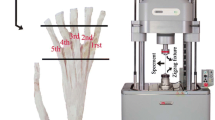Abstract
Most of the foot deformities relate with the arch collapse or instability, especially the medial longitudinal one. Though the function of the plantar fascia to the arch height has been investigated by some authors, the other plantar ligaments‘ effects are still unclear. The purpose of this study is to explore the roles of the plantar soft tissues in the foot arch biomechanics, including the plantar fascia, spring ligament complex, short plantar ligament and long plantar ligament through normal adult fresh frozen specimens in different injured condition. Also, a three-dimensional finite element model of a normal left foot was developed, which was comprising most joints of the foot and consisted of bone segments, major ligaments and plantar soft tissue. The validity of the three-dimensional finite element model was verified by comparing results with experimentally measured data via the displacements and Von-mise stress of each bone segments. These intrinsic ligaments of the foot arch were sectioned in different sequences in the cadaveric experiment, which simulated the different pathologic situations of the plantar ligaments injury and described the bone segments displacement and stress distribution.
Preview
Unable to display preview. Download preview PDF.
Similar content being viewed by others
References
Sarrafian, S.K.: Functional characteristics of the foot and plantar aponeurosis under tibiotalar loading. Foot Ankle 8, 4–18 (1987)
Murphy, A.: Pneumaticos. Biomechanical Consequences of Sequential Plantar Fascia Release. Foot Ankle Int. 19, 149–152 (1998)
Chuter, V., Payne, C.: Limited joint mobility and plantar fascia function in Charcot’s neuroarthropathy. Diabet Med. 18, 558–561 (2001)
Snider, M.P., Clancy, W.G., McBeath, A.A.: Plantar fascia release for chronic plantar fasciitis in runners. Am. J. Sports Med. 11, 215–219 (1983)
Taniguchi, A., Tanaka, Y., Takakura, Y., Kadono, K., Maeda, M., Yamamoto, H.: Anatomy of the spring ligament. J. Bone Joint Surg. Am. 85, 2174–2178 (2003)
Huang, C.K., Kitaoka, H.B., An, K.N., et al.: Biomechanical evaluation of longitudinal arch stability. Foot Ankle 14, 353–357 (1993)
Kitaoka, H.B., Luo, Z.P., An, K.N.: Analysis of longitudinal arch supports in stabilizing the arch of the foot. Clin. Orthop. Relat. Res. 250–256 (1997)
Kitaoka, H.B., Luo, Z.P., An, K.N.: Reconstruction operations for acquired flatfoot: biomechanical evaluation. Foot Ankle Int. 19, 203–207 (1998)
Daly, P.J., Kitaoka, H.B., Chao, E.Y.: Plantar fasciotomy for intractable plantar fasciitis: clinical results and biomechanical evaluation. Foot Ankle 13, 188–195 (1992)
Berkelmans, W.A.M., Poort, H.W., Slooff, T.J.J.H.: A new method to analysis the mechanical behavior of skeletal parts. ACTA. Orthop. Scand. 34, 301–317 (1972)
Salathe Jr., E.P., Arangio, G.A., Salathe, E.P.: A biomechanical model of the foot. J Biomech. 19, 989–1001 (1986)
Arangio, G.A., Reinert, K.L., Salathe, E.P.: A biomechanical model of the effect of subtalar arthroereisis on the adult flexible flat foot. Clin. Biomech. (Bristol, Avon) 19, 847–852 (2004)
Gefen, A.: Stress analysis of the standing foot following surgical plantar fascia release. J. Biomech. 35, 629–637 (2002)
Camacho, D.L., Ledoux, W.R., Rohr, E.S., et al.: A three-dimensional, anatomically detailed foot model: a foundation for a finite element simulation and means of quantifying foot-bone position. J. Rehabil. Res. Dev. 39, 401–410 (2002)
Jacob, S., Patil, M.K.: Three-dimensional foot modeling and analysis of stresses in normal and early stage Hansen’s disease with muscle paralysis. J. Rehabil Res. Dev. 36, 252–263 (1999)
Gefen, A., Megido-Ravid, M., Itzchak, Y., et al.: Biomechanical analysis of the three-dimensional foot structure during gait: a basic tool for clinical applications. J. Biomech. Eng. 122, 630–639 (2000)
Chu, T.M., Reddy, N.P., Padovan, J.: Three-dimensional finite element stress analysis of the polypropylene, ankle-foot orthosis: static analysis. Med. Eng. Phys. 17, 372–379 (1995)
Patil, K.M., Braak, L.H., Huson, A.: Analysis of stresses in two-dimensional models of normal and neuropathic feet. Med. Biol. Eng. Comput. 34, 280–284 (1996)
Cheung, J.T., Zhang, M., Leung, A.K., et al.: Three-dimensional finite element analysis of the foot during standing–a material sensitivity study. J. Biomech. 38, 1045–1054 (2005)
Author information
Authors and Affiliations
Editor information
Rights and permissions
Copyright information
© 2007 Springer-Verlag Berlin Heidelberg
About this paper
Cite this paper
Yang, Y. et al. (2007). Effect of the Plantar Ligaments Injury on the Longitudinal Arch Height of the Human Foot. In: Li, K., Li, X., Irwin, G.W., He, G. (eds) Life System Modeling and Simulation. LSMS 2007. Lecture Notes in Computer Science(), vol 4689. Springer, Berlin, Heidelberg. https://doi.org/10.1007/978-3-540-74771-0_13
Download citation
DOI: https://doi.org/10.1007/978-3-540-74771-0_13
Publisher Name: Springer, Berlin, Heidelberg
Print ISBN: 978-3-540-74770-3
Online ISBN: 978-3-540-74771-0
eBook Packages: Computer ScienceComputer Science (R0)




